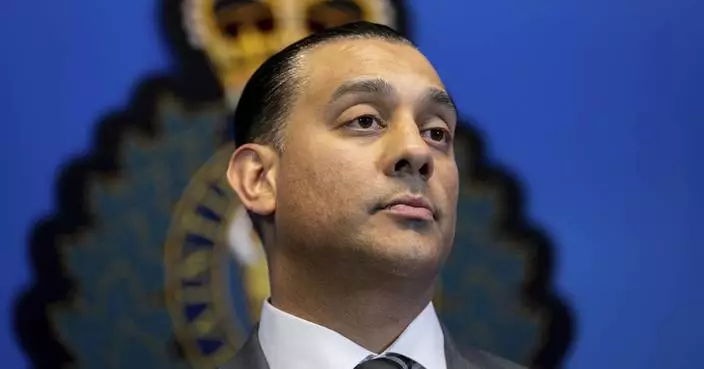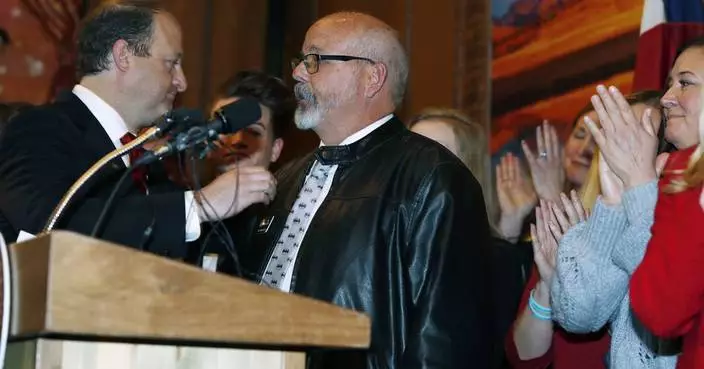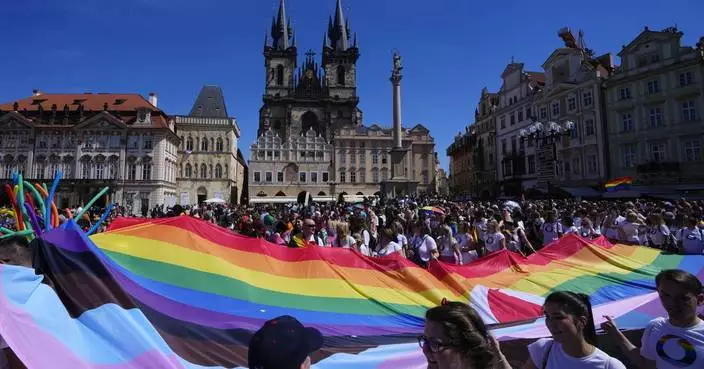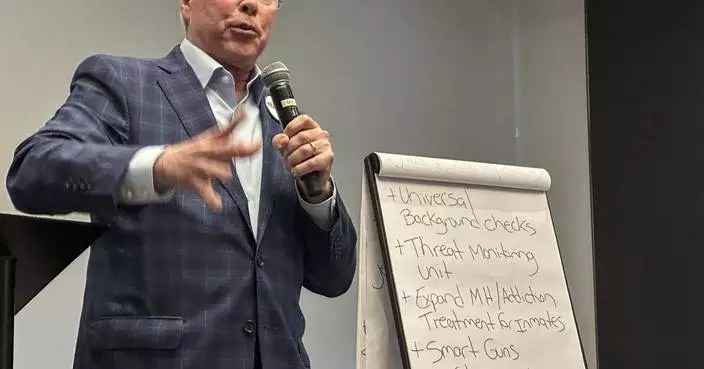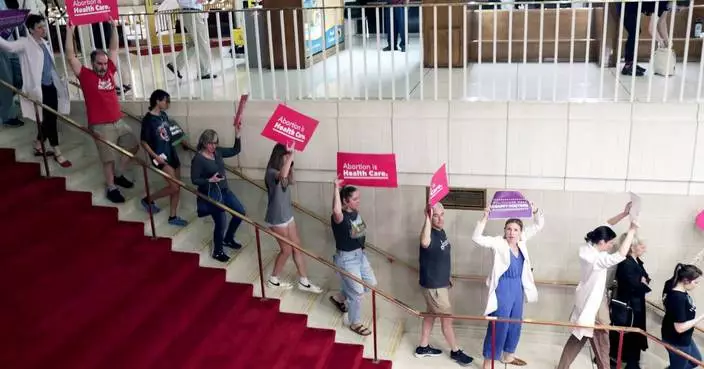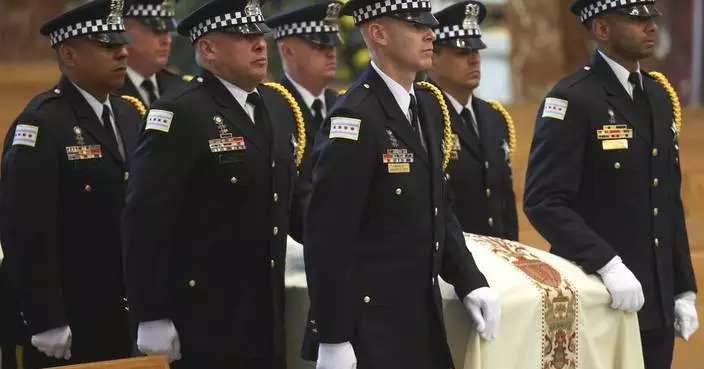The Supreme Court seemed poised Wednesday to uphold President Donald Trump's ban on travel to the U.S. by visitors from several Muslim-majority countries, a move that would hand the president a major victory on a controversial signature policy.
In the court's first full-blown consideration of a Trump order, the conservative justices who make up the court's majority seemed unwilling to hem in a president who has invoked national security to justify restrictions on who can or cannot step on U.S. soil.
Click to Gallery
The Supreme Court seemed poised Wednesday to uphold President Donald Trump's ban on travel to the U.S. by visitors from several Muslim-majority countries, a move that would hand the president a major victory on a controversial signature policy.
The justices in December allowed the ban to take full effect even as the legal fight over it continued, but Wednesday was the first time they took it up in open court. Trump's tough stance on immigration was a centerpiece of his presidential campaign, and he rolled out the first version of the ban just a week after taking office, sparking chaos and protests at a number of airports.
The room was packed for the court's final arguments until October, and people waited in line for seats for days. "Hamilton" creator Lin-Manuel Miranda was in the audience. Demonstrators protesting the ban filled the area outside the building.
She told him she doubted that the president has "the authority to do more than Congress has already decided is adequate" under immigration law. She and Kagan also questioned Francisco closely about whether the ban discriminates against Muslims.
His only question that seemed to favor the challengers came early in the arguments, when he asked Solicitor General Francisco whether Trump's campaign statements should be considered in evaluating the administration's ban. Francisco told the justices they shouldn't look at those campaign statements.
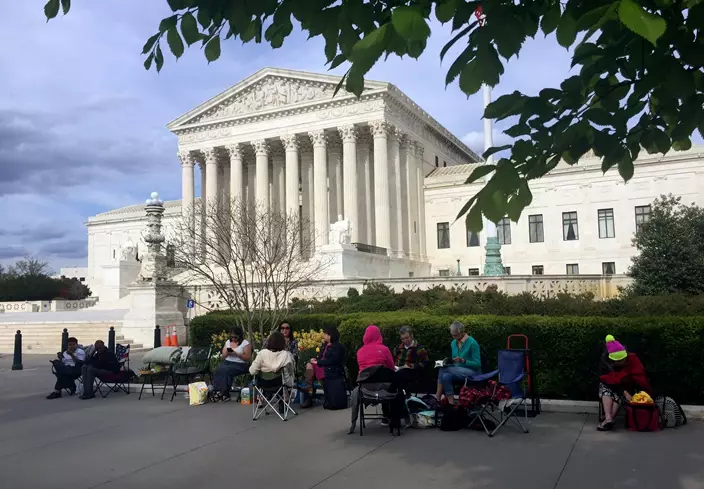
In this April 23, 2018, photo, people wait in line outside the Supreme Court in Washington, to be in the gallery when the court hears arguments in on April 25, over President Donald Trump’s ban on travelers from several mostly Muslim countries. (AP Photo/Jessica Gresko)
The justices in December allowed the ban to take full effect even as the legal fight over it continued, but Wednesday was the first time they took it up in open court. Trump's tough stance on immigration was a centerpiece of his presidential campaign, and he rolled out the first version of the ban just a week after taking office, sparking chaos and protests at a number of airports.
The ban's challengers almost certainly need either Chief Justice John Roberts or Justice Anthony Kennedy on their side if the court is to strike down the policy that its opponents have labeled a Muslim ban.
But neither appeared receptive to arguments made by lawyer Neal Katyal, representing the ban's opponents, that Trump's rule stems from his campaign pledge to keep Muslims out of the country and is unlike immigration orders issued by any other president.k
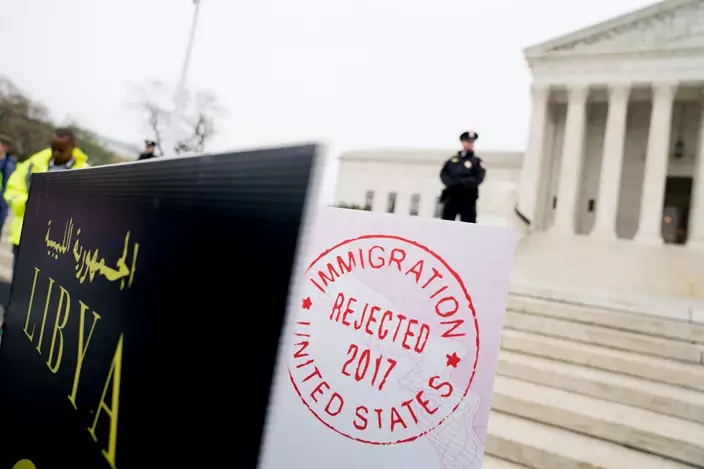
Poster sized enlargements of passports marked as "rejected" by United States Immigration are on display during an anti-Muslim ban rally as the Supreme Court hears arguments about wether President Donald Trump's ban on travelers from several mostly Muslim countries violates immigration law or the Constitution, Wednesday, April 25, 2018, in Washington. (AP Photo/Andrew Harnik)
The room was packed for the court's final arguments until October, and people waited in line for seats for days. "Hamilton" creator Lin-Manuel Miranda was in the audience. Demonstrators protesting the ban filled the area outside the building.
Some who oppose the ban have said courts should treat Trump differently from his predecessors. But that issue was raised only obliquely from the bench when Justice Elena Kagan talked about a hypothetical president who campaigned on an anti-Semitic platform and then tried to ban visitors from Israel.
When Solicitor General Noel Francisco, defending the ban, started to answer that such a turn of events was extremely unlikely because of the two countries' close relationship, Kagan stopped him. "This is an out-of-the-box kind of president in my hypothetical," she said, to laughter.
"We don't have those, Your Honor," Francisco replied.
While there was discussion about Trump's statements both as a candidate and as president, no justice specifically referenced his tweets on the subject, despite Katyal's attempt to get them to focus on last fall's retweets of inflammatory videos that stoked anti-Islam sentiment.
Justice Sonia Sotomayor was the most aggressive questioner of Francisco.
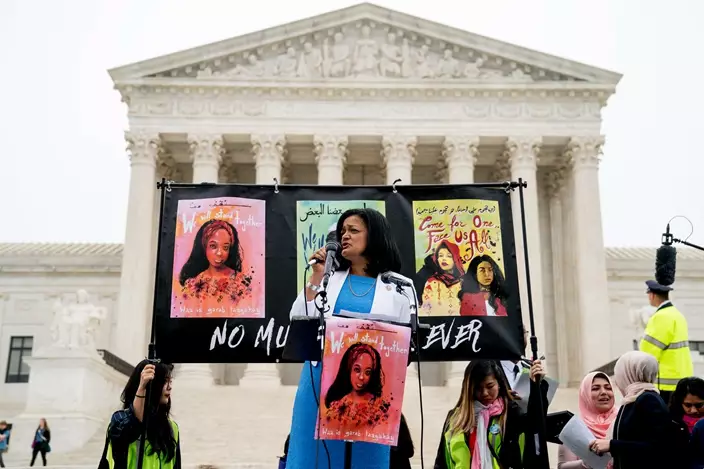
Rep. Pramila Jayapal, D-Wash, speaks at an anti-Muslim ban rally outside the Supreme Court as the court hears arguments about wether President Donald Trump's ban on travelers from several mostly Muslim countries violates immigration law or the Constitution, Wednesday, April 25, 2018, in Washington. (AP Photo/Andrew Harnik)
She told him she doubted that the president has "the authority to do more than Congress has already decided is adequate" under immigration law. She and Kagan also questioned Francisco closely about whether the ban discriminates against Muslims.
From the other side, Kennedy challenged Katyal about whether the ban would be unending. He said the policy's call for a report every six months "indicates there'll be a reassessment" from time to time.
"You want the president to say, 'I'm convinced that in six months we're going to have a safe world,'" Kennedy said, seemingly rejecting Katyal's argument.
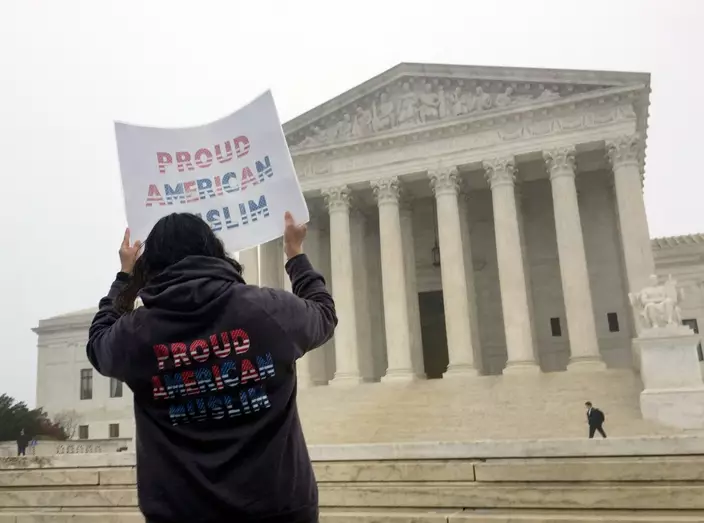
Seema Sked, 39, of Richmond, Va, demonstrates outside the Supreme Court ahead of arguments over President Donald Trump's travel ban on Wednesday, April 25, 2018, in Washington. (AP Photo/Jessica Gresko)
His only question that seemed to favor the challengers came early in the arguments, when he asked Solicitor General Francisco whether Trump's campaign statements should be considered in evaluating the administration's ban. Francisco told the justices they shouldn't look at those campaign statements.
Kennedy pressed on that point. Speaking of a hypothetical candidate for mayor, he asked if what was said during that candidate's campaign was irrelevant if on "day two" of his administration the new mayor acted on those statements.
Francisco held his ground saying the presidential oath of office "marks a fundamental transformation."

Neal Katyal, the attorney who argued against the Trump administration in the case Trump v. Hawaii, speaks to members of the media outside the Supreme Court, Wednesday, April 25, 2018, in Washington. (AP Photo/Andrew Harnik)
With Katyal at the lectern, Justice Samuel Alito said it seemed wrong to call the travel policy a Muslim ban when it applies to just five of 50 mostly Muslim countries, 8 percent of the world's Muslim population and only one country — Iran — among the 10 largest with Muslim majorities. "Would a reasonable observer think this is a Muslim ban?" Alito asked.
Outside the court, opponents of the ban held signs that read "No Muslim Ban. Ever" and "Refugees Welcome." In another indication of heightened public interest, the court released an audio recording after arguments ended. The last time the court did that was for gay marriage arguments in 2015.
The justices are looking at the third version of a policy that Trump brought out shortly after taking office. That brought immediate turmoil as travelers were stopped at airports and some were detained for hours. The first version was blocked by courts and withdrawn. Its replacement was allowed to take partial effect, but expired in September.
The current version is indefinite and now applies to travelers from five countries with overwhelmingly Muslim populations — Iran, Libya, Somalia, Syria and Yemen. It also affects two non-Muslim countries, blocking travelers from North Korea and some Venezuelan government officials and their families. A sixth majority-Muslim country, Chad, was removed from the list this month after improving "its identity-management and information sharing practices," Trump said in a proclamation.
The administration has argued that courts have no role to play because the president has broad powers over immigration and national security, and foreigners have no right to enter the country. Francisco also has said in written arguments that Trump's September proclamation laying out the current policy comports with immigration law and does not violate the Constitution because it does not single out Muslims.
The challengers have said that Trump is flouting immigration law by trying to keep more than 150 million people, the vast majority of them Muslim, from entering the country. They also argue that his policy amounts to the Muslim ban that he called for as a candidate, violating the Constitution's prohibition against religious bias.
The case is Trump v. Hawaii, 17-965.
SAN FRANCISCO (AP) — The California Supreme Court is weighing whether to keep a measure off the November ballot that would make it harder for the state and local governments to raise taxes, in a legal battle pitting Gov. Gavin Newsom and Democratic lawmakers against the business groups and taxpayer advocates who organized the initiative.
Several of the seven justices who heard arguments Wednesday questioned whether keeping the entire measure from the ballot, which would be a rare step for the court, was the best option. The justices also sought to better understand the measure’s impact on local governments’ ability to raise taxes and fees.
Under the current system, the Legislature can raise taxes with a two-thirds vote in both the Senate and Assembly. The initiative would require that voters also approve any new tax hikes after legislative passage for them to take effect.
The measure would also change the voting threshold by which communities can raise taxes through ballot initiatives, from a simple majority to a two-thirds majority.
A lawsuit filed last fall by Newsom, the Legislature and others sought to have the measure removed from the ballot, saying it would change the power of taxation assigned by the California Constitution to the Legislature and weaken the executive branch’s administrative and regulatory powers.
Thomas Hiltachk, a lawyer representing supporters of the measure, told the court the initiative should be allowed because the concerns over its possible impacts are based on speculation. Aspects of it could be challenged later if it is approved, he added.
Statements about the measure’s impact are “based not on evidence submitted to this court but on the opinions of people in the government who do not want change,” Hiltachk said.
The court is expected to decide before June 27, the deadline for the Secretary of State to certify the general election ballot.
Opponents of the measure say it would effectively, and unlawfully, amend the state constitution without going through the usual process of ratification at a constitutional convention or two-thirds approval in the Legislature, followed by a measure put before voters. The measure would take away lawmakers’ ability to impose taxes and leave them only with the power to propose them, said Margaret Prinzing, who represented Newsom and the Legislature.
“That’s a fundamental shift in power that separates (this measure) from all the other tax measures that have come before it,” she told the justices.
The measure would also reclassify many government fees as taxes and apply retroactively to any increase approved after Jan. 1, 2022.
Opponents also say that would curtail revenue needed by local communities for essential public services, from collecting trash to fighting fires, and make it hard to respond to emergencies like earthquakes and pandemics.
The proposal would put more than 100 local measures, totaling $2 billion in annual funding, at risk, said Carolyn Coleman, CEO of the League of California Cities. It opposes the measure, alongside firefighters and teachers unions, calling it “deceptive” and “an existential threat” to local governments.
“We’re raising the resources to fill potholes, so that we can support affordable housing in our community, so we can work to address homelessness, so that when you dial 911 there’s somebody there to answer the phone — not in two minutes — but in 30 seconds,” Coleman said. “So this really goes against the essential nature of how local government raises the revenues to provide services that everyone wants.”
Brooke Armour, executive vice president of the California Business Roundtable, which represents large companies and is a lead proponent of the initiative, disputed Coleman's numbers, saying only about 28 local initiatives would be affected and it would only impact tax increases posed through citizen initiatives.
Special taxes put on the ballot by local elected officials already require a two-thirds vote for approval, Armour added, and all measures raising general taxes would still be approved with a majority vote.
Associate Justice Goodwin Liu asked Hiltachk about what types of fees or taxes would be affected, saying, “If a local senior center wants to charge a fee for rental of its facilities, that now has to be approved by the by the city council. In order to do that, this would be subject to the referendum power, right?”
Hiltachk responded that municipal officials normally enact those types of fees, and they would not be touched. But local and state administrative agencies would no longer be able to raise fees without the approval of the local governing body.
“What we have evolved into is it is an administrative state that has far too much power among non-elected bureaucrats, who no one knows their name, setting fees not for a fishing license fee, that’s not what this is about, but raising billions of dollars out of the economy without any legislative oversight,” he said.
Supporters of the measure say Californians face some of the highest taxes and one of the highest costs of living in the country and that the changes are needed.
“The whole issue here is that they are scared to death of the people of California being empowered to vote on state and local taxes,” said Rob Lapsley, president of the California Business Roundtable.
Newsom and Democrats who dominate statewide government have faced persistent criticism that California has become too expensive for many of its 39 million residents. A Newsom spokesman said the governor's opposition to the measure doesn't indicate he supports higher taxes.
“You can both be opposed to new taxes and to destructive ballot measures that would hamstring government from protecting itself in a crisis,” spokesman Bob Salladay said in a statement.
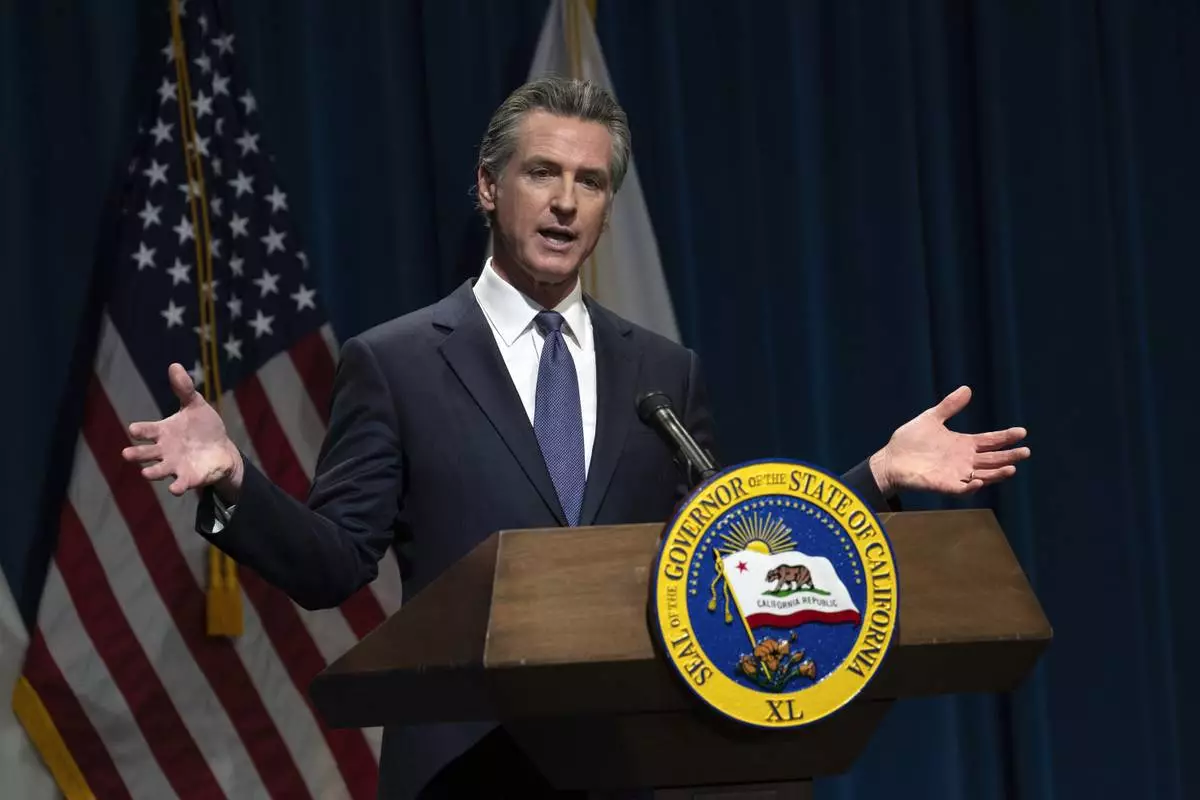
FILE - California Gov. Gavin Newsom discusses his proposed state budget for the 2024-2025 fiscal year, during a news conference in Sacramento, Calif., Jan. 10, 2024. The California Supreme Court will hear arguments Wednesday, May 8, 2024, about whether to remove a measure from the November ballot that would make it harder for state and local governments to raise taxes. (AP Photo/Rich Pedroncelli, File)









